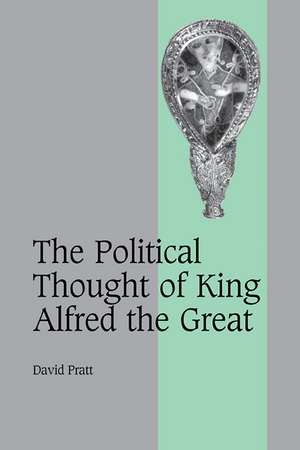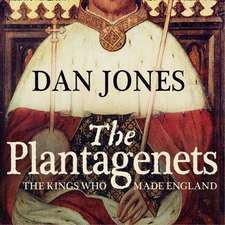The Political Thought of King Alfred the Great: Cambridge Studies in Medieval Life and Thought: Fourth Series, cartea 67
Autor David Pratten Limba Engleză Paperback – 13 ian 2010
| Toate formatele și edițiile | Preț | Express |
|---|---|---|
| Paperback (1) | 370.82 lei 6-8 săpt. | |
| Cambridge University Press – 13 ian 2010 | 370.82 lei 6-8 săpt. | |
| Hardback (1) | 782.40 lei 6-8 săpt. | |
| Cambridge University Press – 30 mai 2007 | 782.40 lei 6-8 săpt. |
Din seria Cambridge Studies in Medieval Life and Thought: Fourth Series
-
 Preț: 202.55 lei
Preț: 202.55 lei -
 Preț: 285.93 lei
Preț: 285.93 lei -
 Preț: 178.26 lei
Preț: 178.26 lei -
 Preț: 193.42 lei
Preț: 193.42 lei - 11%
 Preț: 639.92 lei
Preț: 639.92 lei -
 Preț: 282.10 lei
Preț: 282.10 lei -
 Preț: 321.31 lei
Preț: 321.31 lei - 11%
 Preț: 683.88 lei
Preț: 683.88 lei -
 Preț: 266.37 lei
Preț: 266.37 lei -
 Preț: 314.61 lei
Preț: 314.61 lei -
 Preț: 348.65 lei
Preț: 348.65 lei -
 Preț: 284.39 lei
Preț: 284.39 lei -
 Preț: 329.64 lei
Preț: 329.64 lei -
 Preț: 322.29 lei
Preț: 322.29 lei -
 Preț: 320.93 lei
Preț: 320.93 lei -
 Preț: 286.51 lei
Preț: 286.51 lei -
 Preț: 286.30 lei
Preț: 286.30 lei -
 Preț: 287.87 lei
Preț: 287.87 lei -
 Preț: 285.54 lei
Preț: 285.54 lei -
 Preț: 286.51 lei
Preț: 286.51 lei -
 Preț: 415.73 lei
Preț: 415.73 lei -
 Preț: 282.26 lei
Preț: 282.26 lei -
 Preț: 287.87 lei
Preț: 287.87 lei -
 Preț: 284.98 lei
Preț: 284.98 lei -
 Preț: 284.78 lei
Preț: 284.78 lei -
 Preț: 282.26 lei
Preț: 282.26 lei -
 Preț: 285.16 lei
Preț: 285.16 lei -
 Preț: 287.48 lei
Preț: 287.48 lei -
 Preț: 323.27 lei
Preț: 323.27 lei -
 Preț: 363.69 lei
Preț: 363.69 lei
Preț: 370.82 lei
Nou
Puncte Express: 556
Preț estimativ în valută:
70.97€ • 73.82$ • 58.59£
70.97€ • 73.82$ • 58.59£
Carte tipărită la comandă
Livrare economică 14-28 aprilie
Preluare comenzi: 021 569.72.76
Specificații
ISBN-13: 9780521126441
ISBN-10: 0521126444
Pagini: 436
Dimensiuni: 152 x 229 x 25 mm
Greutate: 0.64 kg
Editura: Cambridge University Press
Colecția Cambridge University Press
Seria Cambridge Studies in Medieval Life and Thought: Fourth Series
Locul publicării:Cambridge, United Kingdom
ISBN-10: 0521126444
Pagini: 436
Dimensiuni: 152 x 229 x 25 mm
Greutate: 0.64 kg
Editura: Cambridge University Press
Colecția Cambridge University Press
Seria Cambridge Studies in Medieval Life and Thought: Fourth Series
Locul publicării:Cambridge, United Kingdom
Cuprins
Acknowledgements; List of abbreviations; 1. Introduction; Part I. The West Saxon Political Order: 2. Resources and extraction; West Saxon resources and royal power; Military service and the common burdens; 3. Royal lordship and secular office-holding; The king's thegns; The royal household; Gifts and gift-giving; 4. Royal lordship and ecclesiastical office-holding; A new accommodation: royal monasteries and the council of Kingston (838); The southumbrian episcopate and the state of ecclesiastical discipline; Bishops as the 'best king's thegns'; Royal priests in the royal household; Frankish ecclesiastical conditions and Carolingian kingship; 5. The articulation of power under King Alfred's predecessors; Collective office-holding: West Saxon royal devotion; Royal office-holding: the first English coronation order; The uses of literacy?; Sources of textual culture (1) ecclesiastical communities; Sources of textual culture (2) the west Saxon royal household; 6. The impact of the Vikings; Logistics of defence; Lordship and manpower; Land and landholding; Royal income and urban development; Collective security (1) 'king of the Anglo-Saxons'; Collective security (2) 'ruler of all the Christians of the island of Britain'; Part II. Alfredian Discourse and its Efficacy: 7. The field of Alfredian knowledge; Alfredian innovation: Alfredian wisdom and the shift to vernacular prose; Intended audiences and the shift to vernacular literacy; Textual dissemination and the field of Alfredian knowledge; 8. The construction of Alfredian discourse; 'Royal' production: Alfredian discourse and its distinctiveness; Languages of office-holding (1) Georgian language; Languages of office-holding (2) Solomon's dream; The implications of Alfredian discourse; 9. Alfredian technology: books and aedificia; Books and book production; Candle-lantern, 'aestels' and the Fuller brooch; 10. The Hierdeboc as a treatise of power; Language and context; The origin and purpose of power; The active and contemplative lives; The hierdeboc and the southumbrian episcopate; 11. The Domboc as a Reorientation of royal law; Written law: authority and status; The construction of Alfredian judgement; The historical projection of secular law; The defence of lordship; The Domboc in practice; 12. Tribulation and triumph in the first fifty psalms; Apparatus and voice; God, rihtwisnes and sinful enemies; Royal hardships and divine justice; Alfred's psalms and Alfredian theatre; 13. The search for a satisfactory consolation; The consolatio philosophiae in context; Royal translation and Carolingian expertise; Alfredian adaption: mind, wisdom and the 'wordly blessings'; Craeft, tools and resources; Wyrd and divine justice; The Froferboc and Alfredian theatre; 14. Seeing God as he is; The Soliloquia in context; Royal translation and Carolingian expertise; Alfredian adaption: wisdom and the sight of God; Lordship and authority; Alfred's soliloquies and Alfredian theatre; 15. Conclusion; Appendix: West Frankish deployment of Solomon's dream; Bibliography; Index.
Recenzii
Review of the hardback: 'Pratt's wide-ranging study offers intriguing speculation into the political causes of Alfred's literary activity.' Stephen J. Harris, Speculum
Review of the hardback: 'This book is compelling argument for the significance of these texts as a body of work directed by a single program. Pratt puts his contribution in its historiographical context and often engages with the work of such eminent scholars on early England as Patrick Wormald and Janet Nelson. One of its real strengths is the frequent comparisons with West Frankish and East Frankish contexts, as well as Mercian, Welsh, and Irish influences … the book is a valuable contribution for the study of intellectual history, the history of political thought, or early medieval kingship.' Comitatus
Review of the hardback: 'This book, with its focus on political thought, and exceptionally large coverage of political practice and the real-life contexts in which ideas were generated and discussed, is a manifesto for a history uniting thought and action. Pratt's central contention, that Alfred was a considerable political thinker in his own right, as well as being a king with a notably successful style and performance of his own, is presented with maximum conviction. It convinces this reviewer. Anyone arguing to the contrary will have to contend with a new-powered case. Anglo-Saxonists will not be the only scholars to await further David-and-Goliath contests with bated breath. Meanwhile this wide-ranging, deep-delving, shiningly crafted book ought to put its author on the historiographical map as surely as it puts King Alfred on political ideas syllabi.' Janet Nelson, H-Albion
Review of the hardback: 'This book is compelling argument for the significance of these texts as a body of work directed by a single program. Pratt puts his contribution in its historiographical context and often engages with the work of such eminent scholars on early England as Patrick Wormald and Janet Nelson. One of its real strengths is the frequent comparisons with West Frankish and East Frankish contexts, as well as Mercian, Welsh, and Irish influences … the book is a valuable contribution for the study of intellectual history, the history of political thought, or early medieval kingship.' Comitatus
Review of the hardback: 'This book, with its focus on political thought, and exceptionally large coverage of political practice and the real-life contexts in which ideas were generated and discussed, is a manifesto for a history uniting thought and action. Pratt's central contention, that Alfred was a considerable political thinker in his own right, as well as being a king with a notably successful style and performance of his own, is presented with maximum conviction. It convinces this reviewer. Anyone arguing to the contrary will have to contend with a new-powered case. Anglo-Saxonists will not be the only scholars to await further David-and-Goliath contests with bated breath. Meanwhile this wide-ranging, deep-delving, shiningly crafted book ought to put its author on the historiographical map as surely as it puts King Alfred on political ideas syllabi.' Janet Nelson, H-Albion
Descriere
An illuminating study of the political thought of ninth-century West Saxon king, Alfred the Great.















